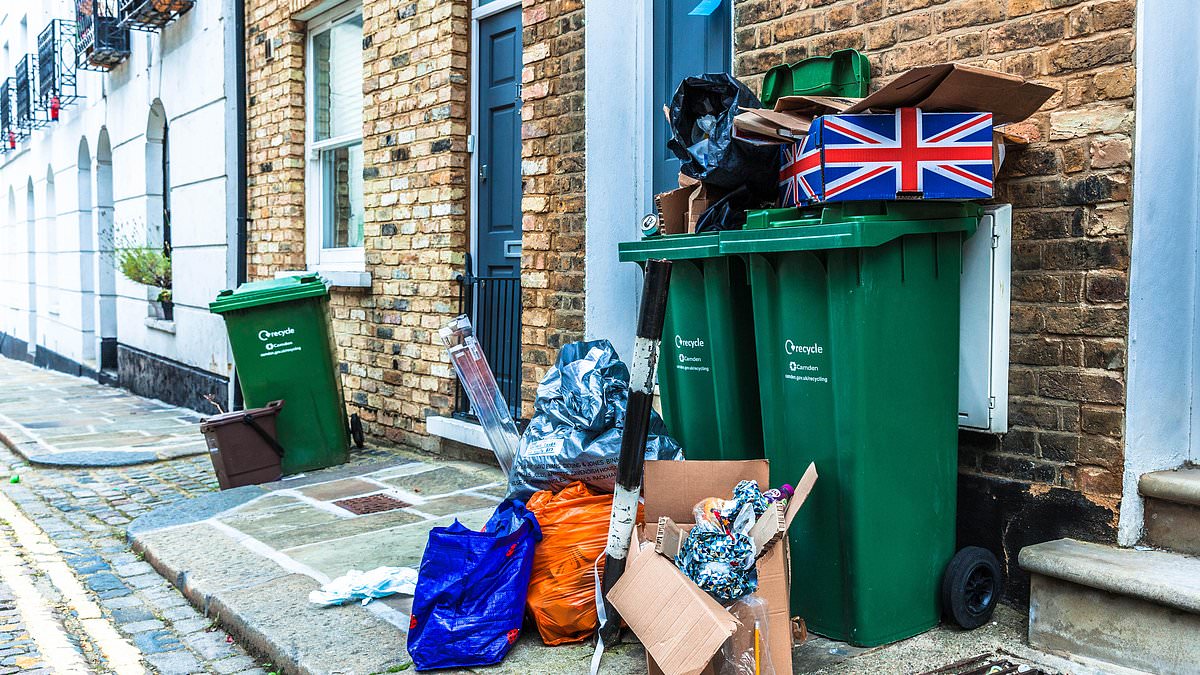Families in some parts of the country are forced to sort their rubbish into as many as ten different bins and bags.
There are huge discrepancies across the UK, with some households made to do far more work than others, reveal campaigners.
On average families have to contend with four different bins for refuse and recycling, the TaxPayers’ Alliance found.
But in dozens of areas there are six while in some Welsh towns and the Cotswolds there is an array of ten different receptacles.
In contrast, lucky residents of Gosport in Hampshire only have two bins to deal with.
It comes despite the previous government trying to get councils to limit the number of waste containers. Former prime minister Rishi Sunak last year claimed he had stopped Britons having to deal with seven bins as part of his watering down of green rules.
Last night John O’Connell, chief executive of the TaxPayers’ Alliance, said: ‘Councils across the UK are placing an enormous burden on households through the often mind-bogglingly complex system of waste separation.
‘Bin collection is one of the key services taxpayers fund yet in large parts of the country it’s the residents themselves responsible for much of the heavy lifting.
‘Recent proposals to simplify the system should be fully enacted across the whole of the United Kingdom.’
Research by the alliance found that residents of Blaenau Gwent, in south-east Wales – who also pay the highest average council tax of £2,099 for a Band D home – deal with the most containers.
Each week binmen collect food waste from green caddies; paper, plastic and metals and glass in separate crates; cardboard in large white bags; batteries in small bags; clothes and small electrical items in different carrier bags; and grass in garden waste bags. Families can also sign up to have nappies collected in special yellow sacks. Rubbish is taken every three weeks.
Households in nearby Merthyr Tydfil sort their rubbish and recycling into ten waste containers as do those covered by Cotswold District Council, Gloucestershire, the TaxPayers’ Alliance said.
Merthyr Tydfil said kerbside recycling was separated into eight bins, bags and boxes, with residents also able to get rid of ‘small electrical items and textiles in clear bags on an ad-hoc basis’.
A spokesman said varied collection cycles mean ‘not all receptacles would be out at any one time’ and recycling rates had risen.
Cotswold District Council said its ‘recycling rate is one of the best in the country’.
Two English councils have nine receptacles while five others have eight. When research was carried out in 2011, only one council had nine bins and none had ten.
In May, the Tory government announced that English councils could collect plastic, metal, glass, paper and card in one bin to stop clutter and confusion but the rules are not yet in force,
Labour is understood to be committed to the drive to make recycling simpler, subject to a looming spending review. A Defra spokesman said measures will be announced ‘in due course’.
